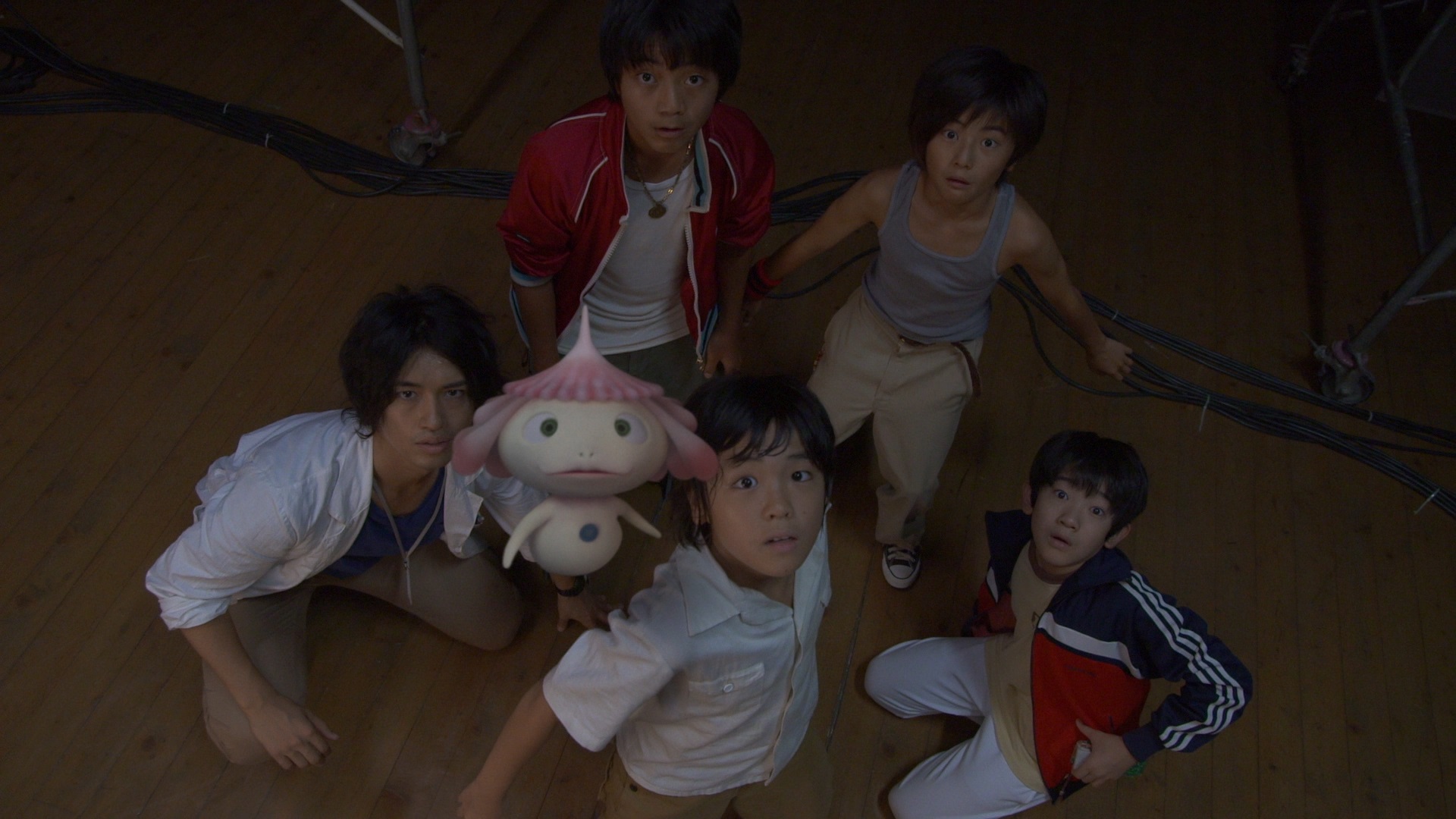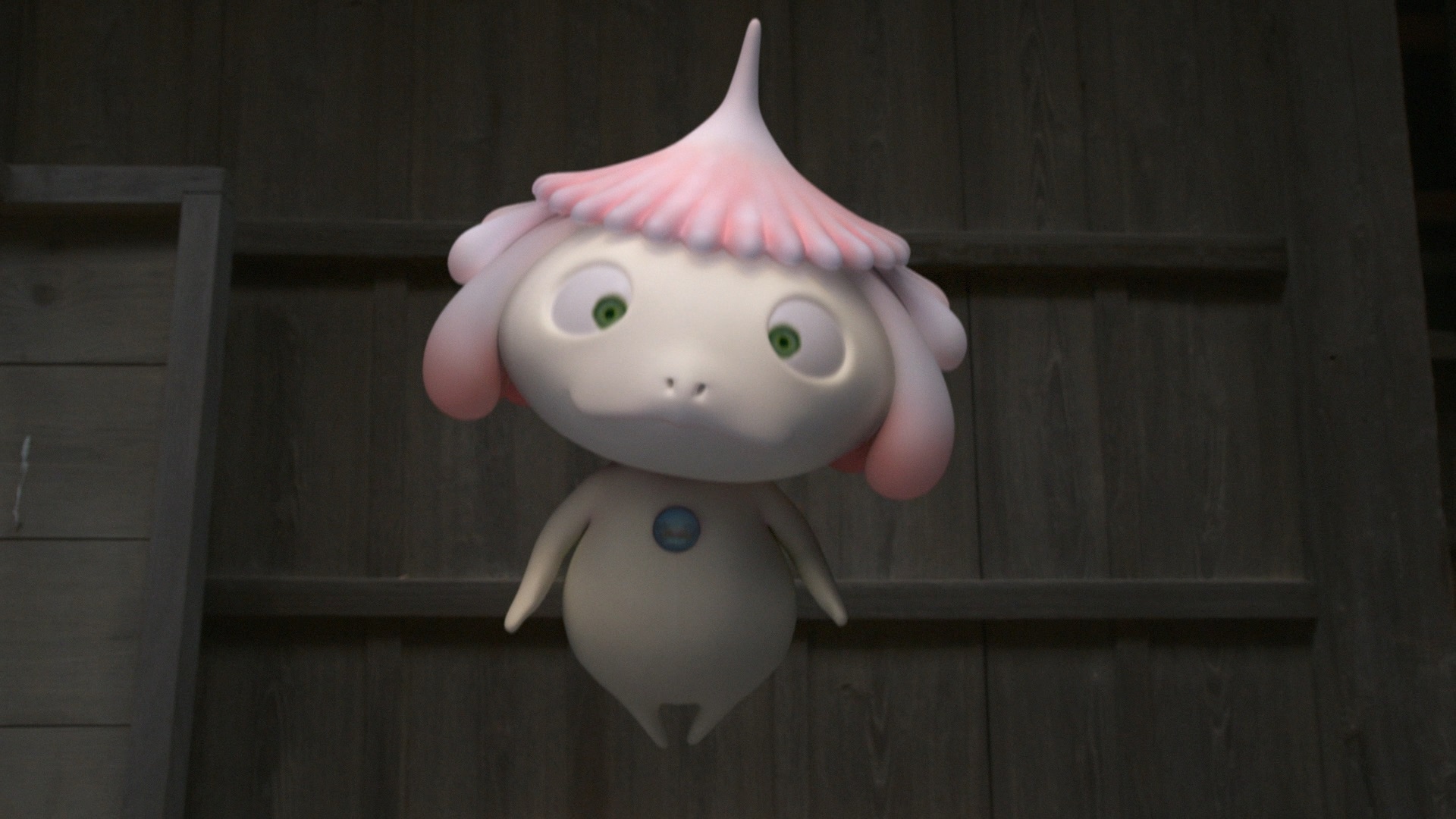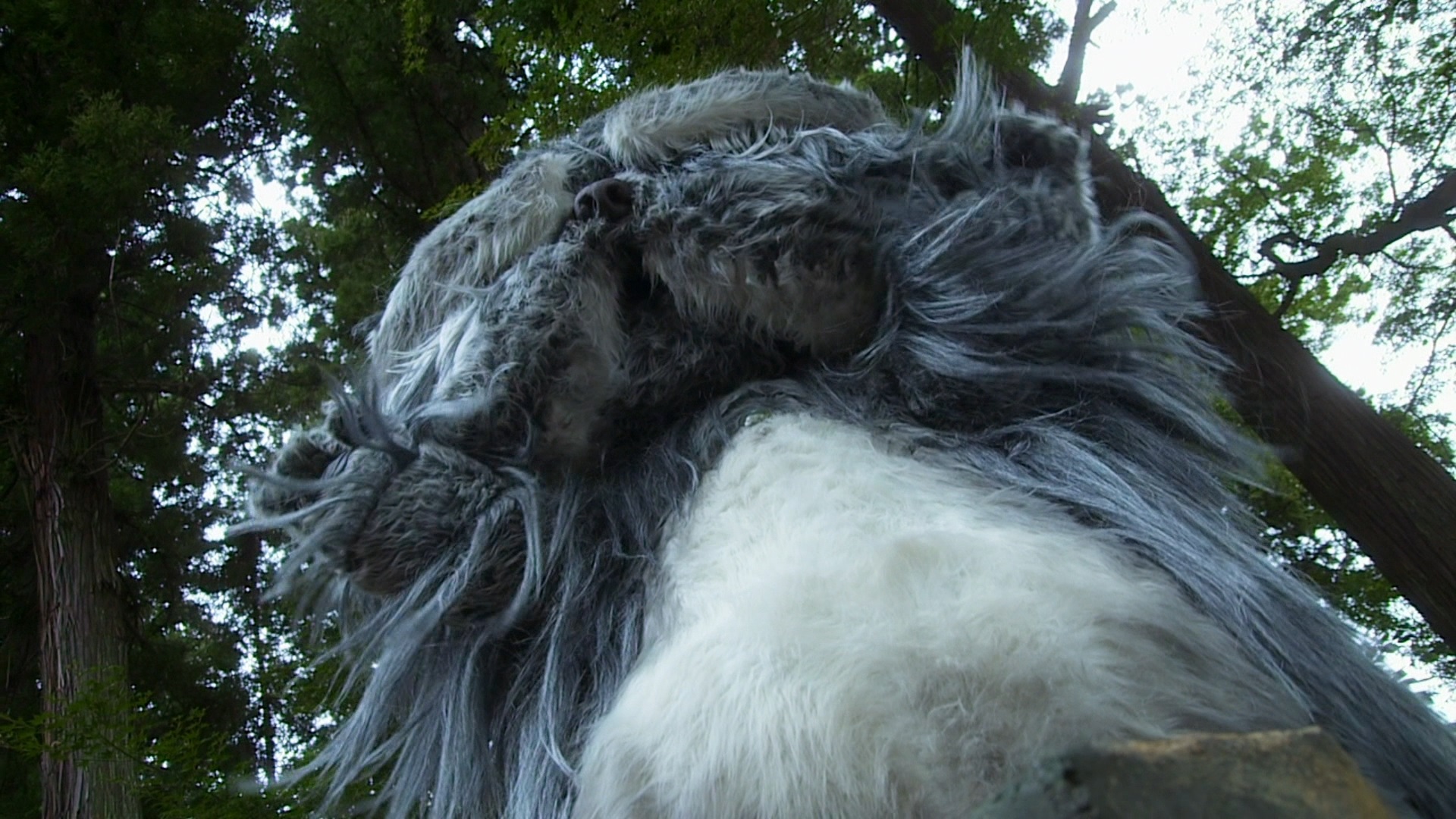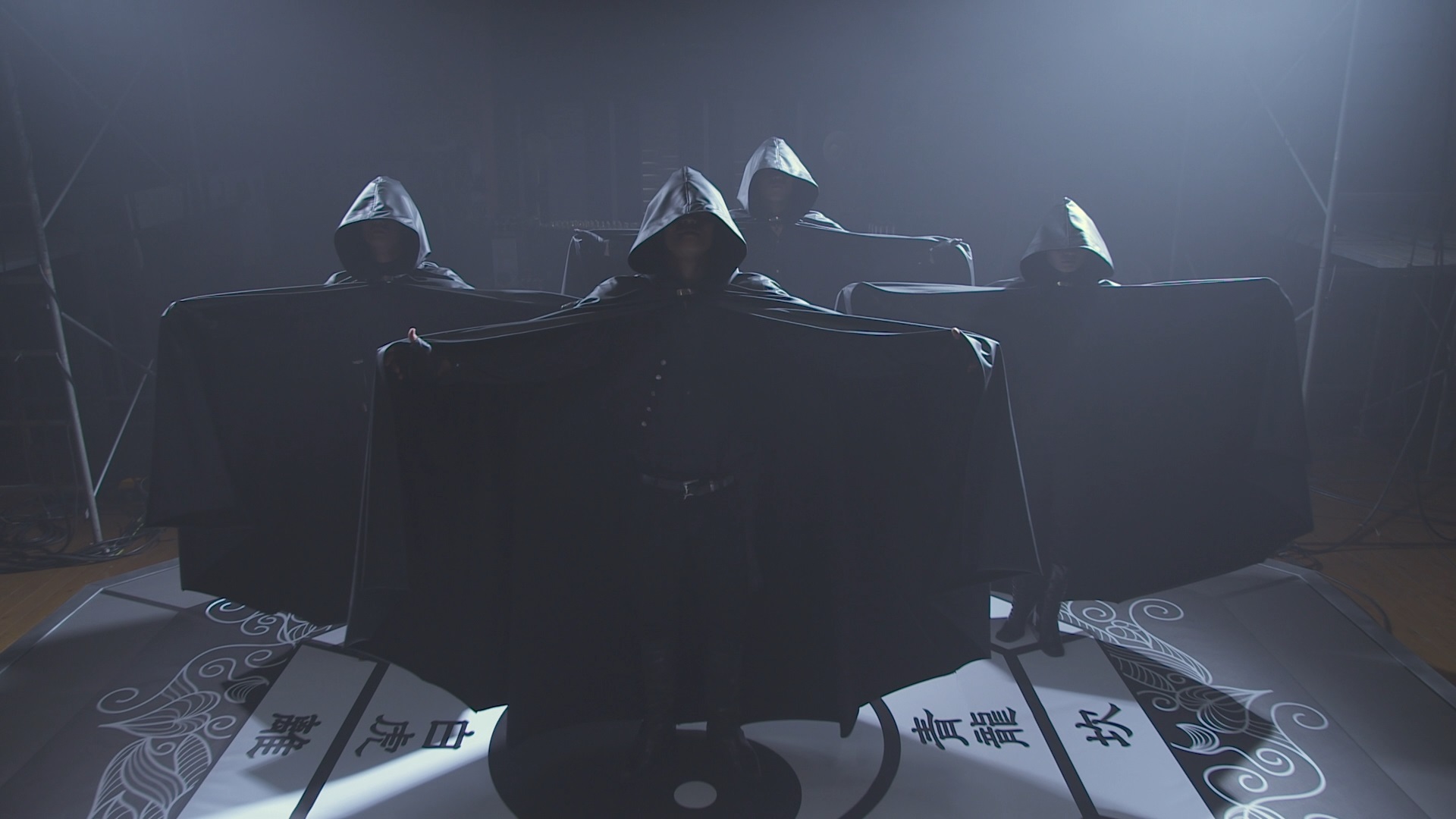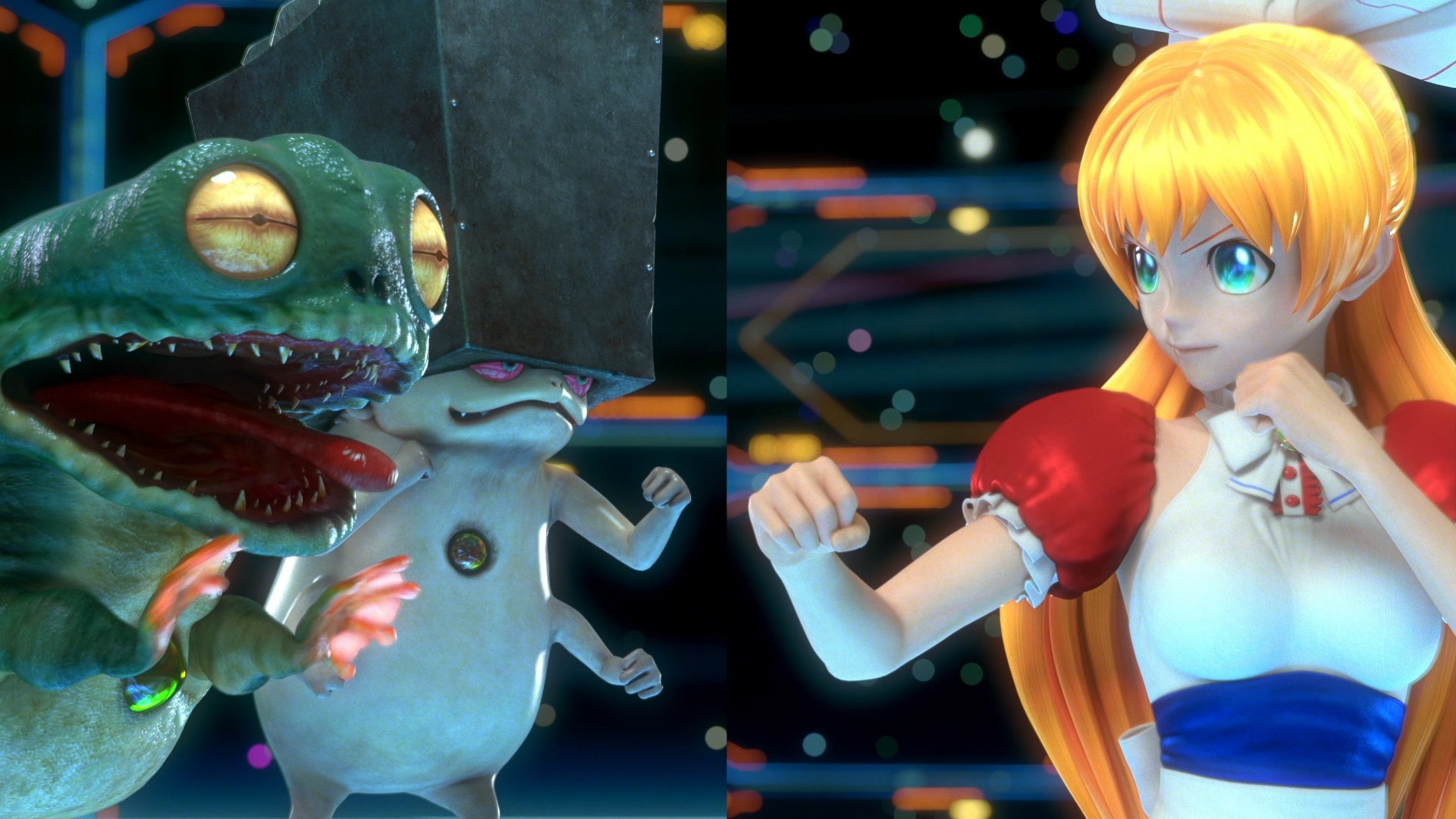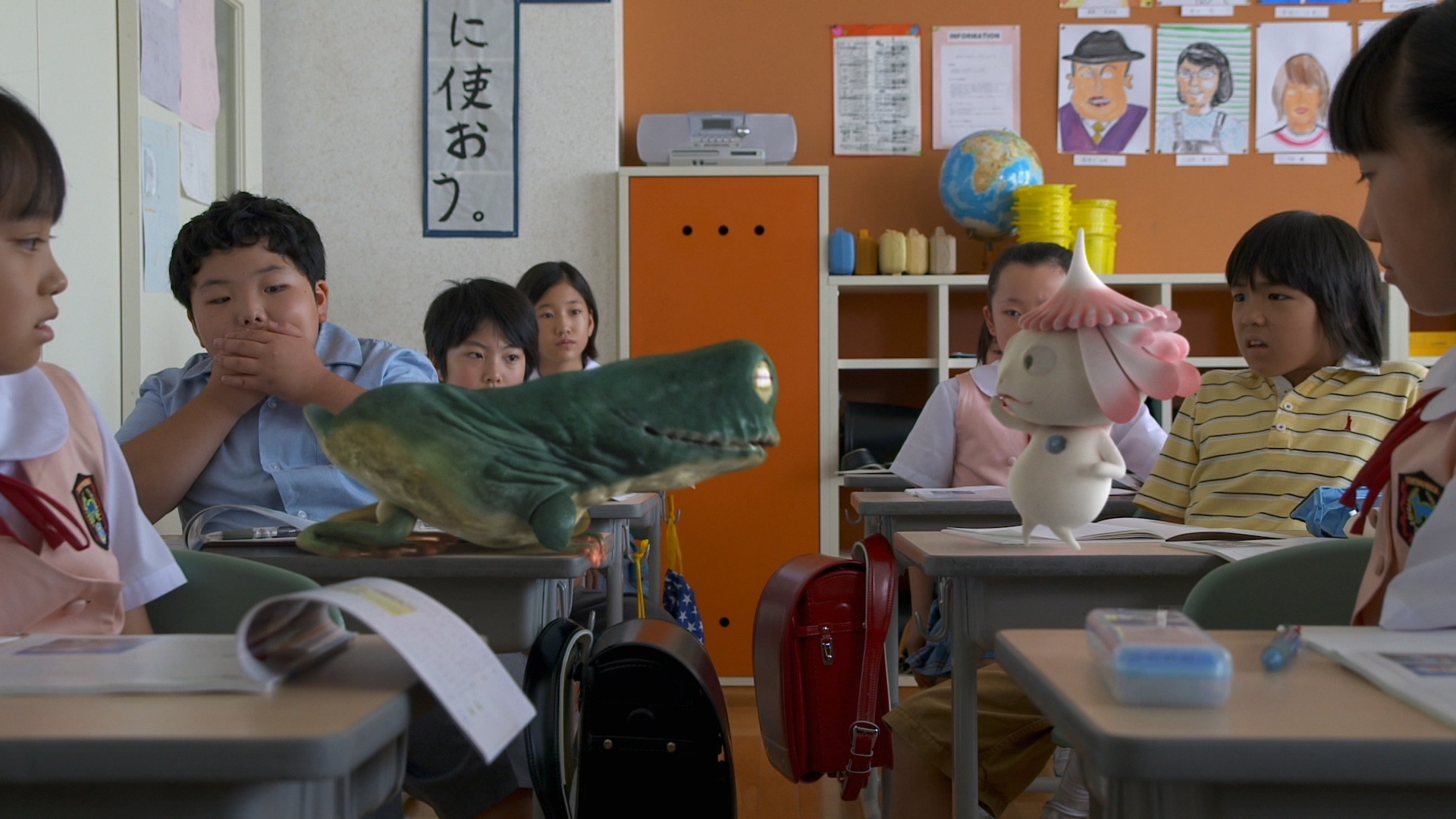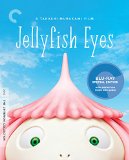| Reviews & Columns |
|
Reviews DVD TV on DVD Blu-ray 4K UHD International DVDs In Theaters Reviews by Studio Video Games Features Collector Series DVDs Easter Egg Database Interviews DVD Talk Radio Feature Articles Columns Anime Talk DVD Savant Horror DVDs The M.O.D. Squad Art House HD Talk Silent DVD
|
DVD Talk Forum |
|
|
| Resources |
|
DVD Price Search Customer Service #'s RCE Info Links |
|
Columns
|
|
|
Jellyfish Eyes
The Criterion Collection // Unrated // December 8, 2015
List Price: $29.95 [Buy now and save at Amazon]
Having conquered every medium from sculptures to handbags, it was inevitable that wildly successful pop artist Takashi Murakami would soon turn his eyes towards feature filmmaking. Murakami has long been outspoken that art and commerce can very much go hand in hand, sneering at the unwise distinction drawn by the Western world between 'high art' and the 'lowbrow'. I largely agree, and I would never try to judge Jellyfish Eyes based on that arbitrary, meaningless spectrum. I would, however, judge Jellyfish Eyes for not being particularly good.
The frustrating thing is that, at least on the surface, Jellyfish Eyes seems as if it could've been tailor-made for me. I have a healthy interest in Japanese culture, including a fair amount of the manga, anime, video games, and kaiju that helped inspire this film. I'm a sucker for one monster, let alone a movie teeming with a hundred of them, each with his own distinctive design. A hefty chunk of the premise revolves around these wee little beasts battling one other. Add in a subplot with a tender, young outsider grieving over his father and thrust into a strange, unfamiliar world, and you have E.T. careening head-on into Digimon with a side trip through Destroy All Monsters. Propelled by the dazzling eye of Takashi Murakami, Jellyfish Eyes sounds as if it could've been the next House, which remains my absolute favorite film that Criterion has ever released.
Alas, Jellyfish Eyes never comes close to living up to that promise. It certainly seems charming enough at first, though, as young Masashi (Takuto Sueoka) tries to settle into his new life. He lost his father in the Fukushima Daiichi disaster, and he and his grieving mother have moved hundreds of miles away to start anew. As luck would have it, Masashi almost immediately makes a new friend: Kurage-bo! He floats. He ravenously scarfs down chee-kama (fishcake and cheese sticks, together at last!). He's entirely too cute for words. He's not just an E.T.; he's a F.R.I.E.N.D.!
Masashi can't resist the temptation to bring his newfound buddy to school with him, tucking him away in his backpack. It's just that...c'mon, you know that Kurage-bo will inevitably sneak out, startling Masashi's classmates and inspiring all sorts of madcap hijinks. Those expectations are halfway there; Kurage-bo gets out, alright, but the other kids in Masashi's class can barely be bothered to notice. Turns out they all have their own digital monsters, although theirs are spawned and controlled by a kinda-sorta smartphone app. You see, a cabal of four cloaked technosorcerers have engineered a way to manipulate negative energy -- fear, anger, mistrust -- and free Japan from the threat of any further catastrophes. This energy is strongest in children, and arming 'em with little beasties to battle it out with one another is a surefire way to get a stockpile going. Not everyone makes the leap from "hey, I have a monster buddy" to "so, we clearly have to make them fight", though, putting Masashi and the kindhearted Saki (Himeka Asami) in pretty much everyone's crosshairs.
From there...I dunno. Scores of monster brawls. A surprisingly bleak stretch with Masashi and Saki left beaten and bloodied, not to mention their bullies being smacked around by their parents. Something that sure looks like a suicide. The reveal that Saki's mother is part of a religious cult vehemently opposed to whatever research is going on at this secretive laboratory. The further reveal that the cult's not wrong, as if four enigmatic cybersorcerers in black cloaks would ever have the best of intentions. An army of kids who've seemingly never played a video game because if you don't know how to take down the final boss, you always look for the glowing gem! As much as I love the reveal that Masashi is hardly the only kid in his class with a monster pal, that's really the only twist that lands. Too much of the rest is either disappointingly routine or another in a long line of unearned "wait, what?"s, hyperconvoluting what at its core is such a straightforward premise.
Murakami mentions throughout the extras that he self-financed Jellyfish Eyes to maintain complete creative control: that having an established studio sign the checks would compromise his criticisms of the Japanese government in the wake of Fukushima Daiichi, that it'd almost certainly lose the doomsday-ish cult subplot altogether, and that its darker elements (such an adult violently choking an eight year old!) would inevitably be neutered. The bizarre thing is that Jellyfish Eyes feels so commercially oriented anyway. I'd expect a film with this sort of gonzo premise helmed by a revered artist to boast outstanding visuals, but that's not really how things shake out. The creature designs are cute but rarely especially memorable. The visual effects aren't polished enough for them to really feel as if they're a part of the same world as these kids, which is part of the reason why the massive, furry Luxor -- the only one that's entirely brought to life by an actor in a suit -- resonates more than any of the rest. Criterion even uses the term "modest-budgeted special effects" in the promotional copy, perhaps to set expections. Murakami's direction is about as routine as it gets, with the camerawork and editing refusing to exhibit anything resembling flair. Even with a slew of not-nearly-as-fun-as-you'd-think monster battles, Jellyfish Eyes struggled to hold my interest. Just when I felt that the movie was finally drawing to a close, a more traditional kaiju-sized monster rears his head, and I realized there was still another half-hour to slog through.
I thought that Criterion was going to treat us to the next House, and instead I suffered through a live-action, made-for-TV Pokémon sequel. Despite the "all-ages" note on the flipside of the case, make no mistake that Jellyfish Eyes is not a family movie but a kids' movie, and there is absolutely a world of difference. Even by those standards, Jellyfish Eyes is a colossal disappointment. Rent It.
Video
I have to confess that Jellyfish Eyes' visual style doesn't play to my tastes so much, lit and photographed such that it plays more like video rather than a feature film. It can be jarring to bound from one sequence that's sweeping and cinematic to another that barely looks one step above a consumer-grade camcorder:
Jellyfish Eyes is remarkably ambitious for such a fiercely independent production, but its rushed shooting schedule and very modest budget do not go unnoticed. Looking past that, however, Criterion's presentation is expectedly marvelous. The image is crisp and richly detailed, boasting an achingly gorgeous palette of lush, green grass and piercing sky blues. Jellyfish Eyes' colors are attuned to its tone, and when the colossal Oval is unleashed, the film's saturation and hope alike are largely drained away.
Boasting as strong a presentation as the source material will allow, Jellyfish Eyes swoops onto a dual-layer Blu-ray disc at its native aspect ratio of 1.78:1.
Audio
Presented exclusively in its original Japanese, this 24-bit, six-channel DTS-HD Master Audio soundtrack suits the mini-monster mayhem masterfully: a saucer-eyed video game outcast discharging one spectacular energy blast after another, the blockheaded, jet-propelled Simon soaring around from one channel to the next, a nightmarish tidal wave of radiation bearing down, the skyscraper-sized Oval taking a thunderous tumble, and the foundation-rattling bass as the singularity mechanism roars to life. Jellyfish Eyes' sound design isn't as playful outside of the monster battles and the psychedelic opening sequence, although its score -- alternating between spare piano and bouncy electronic numbers -- makes up for that by filling every available speaker. Its dialogue is clean, clear, and perfectly balanced, and, as expected for such a recent production, there are no pops, clicks, dropouts, or intrusive background noise to speak of whatsoever. Not quite exceptional but still very well done.
English subtitles are, of course, offered as well, though there is no secondary stream for the deaf and hard of hearing. Somewhat curiously, although Jellyfish Eyes' dialogue is delivered entirely in Japanese, its opening titles and end credits are in English.
Extras
It's not often that I dislike a movie but greatly enjoy its extras, but that somehow turns out to be the case with Jellyfish Eyes.
Jellyfish Eyes also includes a fold-out booklet with liner notes by Glen Helfand.
The Final Word
Crafted by one of the most successful pop artists the world over, overflowing with a small army of monsters, and with the prestige of Criterion behind it, I went into Jellyfish Eyes expecting a film perhaps even more visually entrancing and wildly imaginative than House. This instead is a disappointingly routine fantasy/adventure aimed squarely at the junior set. Unevenly paced, not the least bit engaging, and not even as much of an adrenaline rush as a gaggle of too-cute beasties duking it out for an hour and a half ought to be, Jellyfish Eyes ranks as one of the most lackluster additions to the Criterion Collection in quite a long while. Rent It.
The frustrating thing is that, at least on the surface, Jellyfish Eyes seems as if it could've been tailor-made for me. I have a healthy interest in Japanese culture, including a fair amount of the manga, anime, video games, and kaiju that helped inspire this film. I'm a sucker for one monster, let alone a movie teeming with a hundred of them, each with his own distinctive design. A hefty chunk of the premise revolves around these wee little beasts battling one other. Add in a subplot with a tender, young outsider grieving over his father and thrust into a strange, unfamiliar world, and you have E.T. careening head-on into Digimon with a side trip through Destroy All Monsters. Propelled by the dazzling eye of Takashi Murakami, Jellyfish Eyes sounds as if it could've been the next House, which remains my absolute favorite film that Criterion has ever released.
Alas, Jellyfish Eyes never comes close to living up to that promise. It certainly seems charming enough at first, though, as young Masashi (Takuto Sueoka) tries to settle into his new life. He lost his father in the Fukushima Daiichi disaster, and he and his grieving mother have moved hundreds of miles away to start anew. As luck would have it, Masashi almost immediately makes a new friend: Kurage-bo! He floats. He ravenously scarfs down chee-kama (fishcake and cheese sticks, together at last!). He's entirely too cute for words. He's not just an E.T.; he's a F.R.I.E.N.D.!
Masashi can't resist the temptation to bring his newfound buddy to school with him, tucking him away in his backpack. It's just that...c'mon, you know that Kurage-bo will inevitably sneak out, startling Masashi's classmates and inspiring all sorts of madcap hijinks. Those expectations are halfway there; Kurage-bo gets out, alright, but the other kids in Masashi's class can barely be bothered to notice. Turns out they all have their own digital monsters, although theirs are spawned and controlled by a kinda-sorta smartphone app. You see, a cabal of four cloaked technosorcerers have engineered a way to manipulate negative energy -- fear, anger, mistrust -- and free Japan from the threat of any further catastrophes. This energy is strongest in children, and arming 'em with little beasties to battle it out with one another is a surefire way to get a stockpile going. Not everyone makes the leap from "hey, I have a monster buddy" to "so, we clearly have to make them fight", though, putting Masashi and the kindhearted Saki (Himeka Asami) in pretty much everyone's crosshairs.
From there...I dunno. Scores of monster brawls. A surprisingly bleak stretch with Masashi and Saki left beaten and bloodied, not to mention their bullies being smacked around by their parents. Something that sure looks like a suicide. The reveal that Saki's mother is part of a religious cult vehemently opposed to whatever research is going on at this secretive laboratory. The further reveal that the cult's not wrong, as if four enigmatic cybersorcerers in black cloaks would ever have the best of intentions. An army of kids who've seemingly never played a video game because if you don't know how to take down the final boss, you always look for the glowing gem! As much as I love the reveal that Masashi is hardly the only kid in his class with a monster pal, that's really the only twist that lands. Too much of the rest is either disappointingly routine or another in a long line of unearned "wait, what?"s, hyperconvoluting what at its core is such a straightforward premise.
Murakami mentions throughout the extras that he self-financed Jellyfish Eyes to maintain complete creative control: that having an established studio sign the checks would compromise his criticisms of the Japanese government in the wake of Fukushima Daiichi, that it'd almost certainly lose the doomsday-ish cult subplot altogether, and that its darker elements (such an adult violently choking an eight year old!) would inevitably be neutered. The bizarre thing is that Jellyfish Eyes feels so commercially oriented anyway. I'd expect a film with this sort of gonzo premise helmed by a revered artist to boast outstanding visuals, but that's not really how things shake out. The creature designs are cute but rarely especially memorable. The visual effects aren't polished enough for them to really feel as if they're a part of the same world as these kids, which is part of the reason why the massive, furry Luxor -- the only one that's entirely brought to life by an actor in a suit -- resonates more than any of the rest. Criterion even uses the term "modest-budgeted special effects" in the promotional copy, perhaps to set expections. Murakami's direction is about as routine as it gets, with the camerawork and editing refusing to exhibit anything resembling flair. Even with a slew of not-nearly-as-fun-as-you'd-think monster battles, Jellyfish Eyes struggled to hold my interest. Just when I felt that the movie was finally drawing to a close, a more traditional kaiju-sized monster rears his head, and I realized there was still another half-hour to slog through.
I thought that Criterion was going to treat us to the next House, and instead I suffered through a live-action, made-for-TV Pokémon sequel. Despite the "all-ages" note on the flipside of the case, make no mistake that Jellyfish Eyes is not a family movie but a kids' movie, and there is absolutely a world of difference. Even by those standards, Jellyfish Eyes is a colossal disappointment. Rent It.
Video
I have to confess that Jellyfish Eyes' visual style doesn't play to my tastes so much, lit and photographed such that it plays more like video rather than a feature film. It can be jarring to bound from one sequence that's sweeping and cinematic to another that barely looks one step above a consumer-grade camcorder:
Jellyfish Eyes is remarkably ambitious for such a fiercely independent production, but its rushed shooting schedule and very modest budget do not go unnoticed. Looking past that, however, Criterion's presentation is expectedly marvelous. The image is crisp and richly detailed, boasting an achingly gorgeous palette of lush, green grass and piercing sky blues. Jellyfish Eyes' colors are attuned to its tone, and when the colossal Oval is unleashed, the film's saturation and hope alike are largely drained away.
Boasting as strong a presentation as the source material will allow, Jellyfish Eyes swoops onto a dual-layer Blu-ray disc at its native aspect ratio of 1.78:1.
Audio
Presented exclusively in its original Japanese, this 24-bit, six-channel DTS-HD Master Audio soundtrack suits the mini-monster mayhem masterfully: a saucer-eyed video game outcast discharging one spectacular energy blast after another, the blockheaded, jet-propelled Simon soaring around from one channel to the next, a nightmarish tidal wave of radiation bearing down, the skyscraper-sized Oval taking a thunderous tumble, and the foundation-rattling bass as the singularity mechanism roars to life. Jellyfish Eyes' sound design isn't as playful outside of the monster battles and the psychedelic opening sequence, although its score -- alternating between spare piano and bouncy electronic numbers -- makes up for that by filling every available speaker. Its dialogue is clean, clear, and perfectly balanced, and, as expected for such a recent production, there are no pops, clicks, dropouts, or intrusive background noise to speak of whatsoever. Not quite exceptional but still very well done.
English subtitles are, of course, offered as well, though there is no secondary stream for the deaf and hard of hearing. Somewhat curiously, although Jellyfish Eyes' dialogue is delivered entirely in Japanese, its opening titles and end credits are in English.
Extras
It's not often that I dislike a movie but greatly enjoy its extras, but that somehow turns out to be the case with Jellyfish Eyes.
- Takashi Murakami (23 min.; HD): If only Jellyfish Eyes were this engaging...! I can't possibly say enough good things about this interview with the driving creative force behind the film, which addresses how the influence of Ultraman runs far deeper than one might expect, how Jellyfish Eyes was originally conceived as being entirely computer animated, and the urgency behind its short and manic pre-production. The conversation revolves heavily around Murakami's artistic and sociopolitical inspirations, how his art takes shape, and how much of himself he invested creatively and financially into Jellyfish Eyes. Even those unimpressed by the film itself will likely find this interview well-worth a look.
- Making F.R.I.E.N.D.s (16 min.; HD): The pre-production crunch required a hundred monsters to be designed in three short months, with the central eight having to be hammered out in a matter of weeks. "Making F.R.I.E.N.D.s" delves into the designs of these creatures, with Murakami quite literally getting his hands dirty by tweaking clay models. The fly-on-the-wall approach to this featurette is appreciated, more intrigued by the artistic process -- which includes a good bit of creative criticism and repeatedly having to start over from scratch -- than in simply showing off these very inspired designs. Murakami's eye for detail is remarkable, and the rapidly ticking clock adds a level of drama that behind-the-scenes featurettes aren't often able to deliver.
- Takashi Murakami: The Art of Film (40 min.; HD): The lengthiest of Jellyfish Eyes' extras charts the film from its earliest production meetings all the way through the final day of principal photography. It's a very different view of Murakami at work: his deference to his experienced crew, the way in which he covers his eyes as if to let his imagination run rampant without visual distractions, and that he's content to let seasoned director Yoshihiro Nishimura (Mutant Girls Squad) do most of the heavy lifting. In fact, Nishimura is the one predominantly shown directing the actors, guiding the crew, and even calling 'ready' and 'action'. Murakami notes how his company entirely financed Jellyfish Eyes to maintain complete creative control, although I can't quite tell if something's being lost in translation when he and Nishimura speak about this not being a commercial film. Independence and commerciality aren't mutually exclusive. As wonderful as this making-of featurette is, it's a bit disappointing that post-production -- including a round of reshoots and a year of visual effects work -- is completely shrugged off, limited to a single page of text at the very end.
- Trailer (2 min.; HD): Rounding out the extras is a trailer for Jellyfish Eyes 2.
Jellyfish Eyes also includes a fold-out booklet with liner notes by Glen Helfand.
The Final Word
Crafted by one of the most successful pop artists the world over, overflowing with a small army of monsters, and with the prestige of Criterion behind it, I went into Jellyfish Eyes expecting a film perhaps even more visually entrancing and wildly imaginative than House. This instead is a disappointingly routine fantasy/adventure aimed squarely at the junior set. Unevenly paced, not the least bit engaging, and not even as much of an adrenaline rush as a gaggle of too-cute beasties duking it out for an hour and a half ought to be, Jellyfish Eyes ranks as one of the most lackluster additions to the Criterion Collection in quite a long while. Rent It.
|
| Popular Reviews |
| Sponsored Links |
|
|
| Sponsored Links |
|
|
| Release List | Reviews | Shop | Newsletter | Forum | DVD Giveaways | Blu-Ray | Advertise |
|
Copyright 2024 DVDTalk.com All Rights Reserved. Legal Info, Privacy Policy, Terms of Use,
Manage Preferences,
Your Privacy Choices | |||||||









